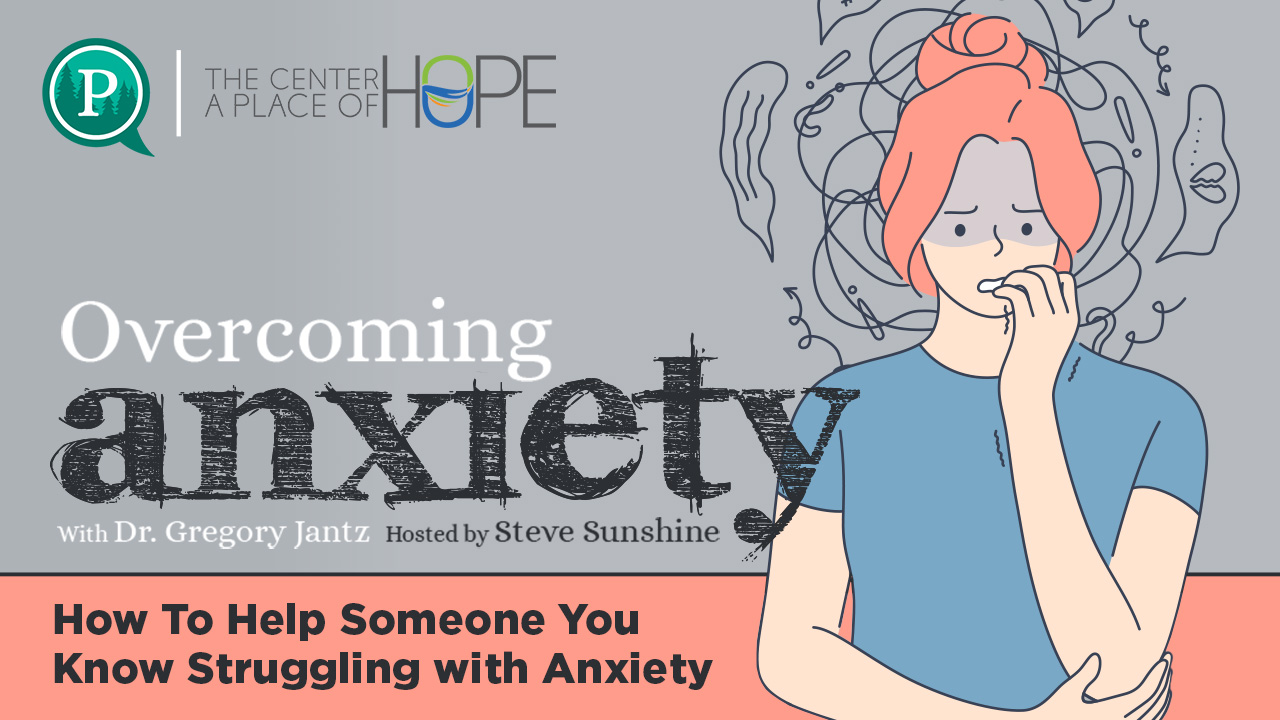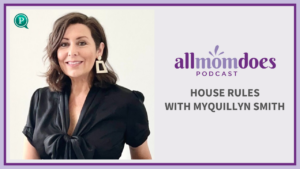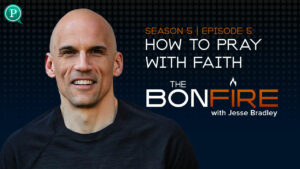How do we come alongside those we love to help when they are struggling with anxiety? Steve Sunshine hosts Dr. Gregory Jantz as they talk about how to listen to those around us and be part of the plan and solution in their lives.
Follow Dr. Jantz online: The Center – A Place Of Hope | Facebook | Instagram | Twitter
Transcription:
Dr. Gregory Jantz Just calm down is a judgment. So, refrain from judgments but acknowledge, it sounds like you’re feeling a lot of things right now. Tell me a little bit about what’s going on, versus Hey, you just calm down. You should just calm down. Yeah. That’s a judgment.
Steve Sunshine: Imagine someone you care about very deeply is in the midst of a difficult struggle against anxiety. What do you do? What do you say? What do you not say?
Hi, I’m Steve Sunshine and welcome to our final episode of Overcoming Anxiety. Dr. Greg Jantz has been our guests throughout this entire series. Dr. Jantz is the founder of The Center – A Place of Hope, and author of the Anxiety Reset and So Much To Live For. On this episode, we’re going to talk about how you can help a loved one overcome anxiety. Here’s my conversation with Dr. Jantz.
Dr. Gregory Jantz: If you have a loved one who has anxiety problems, how do we help? Well, one of the things is, be careful of being overly judgmental, and overly telling them what to do. Look, if you’re suffering from depression or anxiety, I get it. It can be hard to feel like you want to help, help somebody. And it’s a real struggle cause you don’t know what to do.
And sometimes we’re too quick to give answers. Sometimes the person needs us to listen to them and ask the question, tell me, how bad is it? How bad. Tell me what’s going on. Tell me what you’re feeling and thinking, and then really listening. And then ask the question. Well, tell me what, what are, what are you thinking about doing? You know, sometimes the person go, I don’t know. I don’t want to keep, I don’t want to live anymore. And they, maybe they’ve been thinking about suicide. And, and so we really, by listening to a person, can really begin to open the door to maybe saving a life. So, watch judgmentalism. Watch, you know, no quick answers. Help them have empathy. Help them feel heard and listened to, but then be a part of the solution. Well, what’s the solution? Well, who have you talked to about this? Can I be a part of helping you get some assistance? I love and care about you greatly, so be a part of the plan.
Steve Sunshine: You mentioned suicide. I’ve got to ask, if somebody says something like that, like I, I know no longer want to live or whatever the, the clue might be. What do you do?
Dr. Gregory Jantz: My most recent book is called So Much To Live For. It’s a book on dealing with suicide. I never thought I would do a book, Steve, on suicide and it was not even on my radar, but what I saw happening, and happening to our youth. This is something we have to talk about. So, one of the myths, one of the myths is if I use the word suicide, I’m going to give them ideas. That’s a myth. What that means is, ask them, have you thought about harming yourself or taking your life? Do you feel suicidal? And that’s really an important question to ask because nobody’s maybe asked that, and now they’re going to share with you some things. And then you’re going to help them. You’re not going to do it on your own, but you’re going to really do it by involving others. Don’t carry this all on your own. So, there’s a lot of great ideas I put in that little book, So Much To Live For.
Steve Sunshine: So Much To Live For. Okay. If somebody says no to that question, are you considering suicide? Does that, is that, is it fairly safe to say that that, that they’re being honest at that point? Or is it really overreach to, to assume that?
Dr. Gregory Jantz: Well, that’s the thing, we’re, we’re going to, we’re going to ask the question. We’re going to believe what they tell us. We’re going to ask them, well, can I check in with you again? Can we talk again? So have follow-up. If they’re not seeing somebody for help, can I help you? Can we hunt down the right kind of resources for you? So, be a part of the solution. But we’re going to believe what they’re saying, but we’re going to have follow-up
Steve Sunshine: What, you know, as you’re helping somebody through any kind of an anxiety problem, and what are some signs of progress, things, little things you can celebrate.
Dr. Gregory Jantz: Well, I think you start, you can celebrate each day or my, you know, maybe I suck a little longer. I’m going to start each day with gratitude. I’m going to celebrate that. It’s really about putting together those baby steps.
Steve Sunshine: Excellent. So, I know that dealing with either depression or anxiety in a loved one, a spouse, a child, a family member, or friend, can be really, weigh the person who’s trying to help down. How do you help yourself not become anxious because you’re trying to help somebody else through anxiety?
Dr. Gregory Jantz: Yeah. Our own self care is pretty important, isn’t it? Yeah. And you know, sometimes we can overly worry, or overly dependent on how another person’s doing. That’s why I say, we don’t carry this alone. We partner with somebody else. We ask, hey, can I have so-and-so who I know you really loves and cares about you, can I tell them about this? Can we pray for you together? So, begin to share the burden versus being overwhelmed by it. But remember, get help get them to a place or person that can be of great help.
Steve Sunshine: Absolutely. These three words, I imagine you want them banned from helping anybody through an anxiety crisis; just calm down. That’s the gut instinct of a lot of people. Just, that’s just what you want to say. It’s what you feel like needs to be said. It’s I’ve always heard is absolutely the wrong thing to say, because, well, tell us about that.
Dr. Gregory Jantz: No, well, because it probably amplifies their feelings. Just calm down is a judgment, so refrain from judgments. But acknowledge, it sounds like you’re feeling a lot of things right now. Tell me a little bit about what’s going on versus, hey, you just calm down. You should just calm down. Yeah, that’s a judgment.
Steve Sunshine: Okay, sure. That would fit right in with that. So, you’re literally asking somebody at some point, do you want me to try to help you find a solution to this? Or do you just want to you just want to just get it off your chest and let me bear the burden with you? Is it appropriate to ask that question? Because I, I have been in a situation where I listened, and it turned out somebody actually wanted advice.
Dr. Gregory Jantz: Yeah. And by the way, there aren’t some people that are choosing not to get help. Let me just say that. And there’s times where you can offer help and they’re there, they’re not going to receive it. And those are different. And I want us to acknowledge that that will happen. And it’s not about us. You know, it’s sometimes when we’ve seen that somebody has taken their life and it’s tragic. And you go, what, what, I should’ve done something more and it’s easy to get into self-blame. We can never control another person or what they decide to do, and that’s difficult. So, I just want to say there’s sometimes that a person will do what I call help rejecting.
Steve Sunshine: Help rejecting. And what, oh, so they’re rejecting help. And then, and then at that point, you just need to step away?
Dr. Gregory Jantz: I will always be here for you. Let me know in the future. I just want to let you know how much I love and care about you. Okay. You’re going to keep the bridge open.
Steve Sunshine: Keep the bridge open. And I imagine pray a lot at that point to.
Dr. Gregory Jantz: Absolutely.
Steve Sunshine: What do people mostly misunderstand about anxiety?
Dr. Gregory Jantz: Well, one of the myths of anxiety is I can just get over. Or something’s really wrong with me. So, we misjudge it and we misunderstand it. And so, let’s just say there’s always reasons for it. That’s why we pray for discernment and wisdom to know what it is I need to address.
Steve Sunshine: What you know, as we wrap things up, what do you think a person who’s spent the time on, on these five episodes? What what’s, what do you most want them to be, to take away from what we’ve been talking about?
Dr. Gregory Jantz: Well, there’s probably two things that really come to my mind, I want a person to know there is hope, even if you don’t feel it, and there can be a plan if you feel like it’s so overwhelming, I don’t even know where to start, there are those that can help. There are those that are gifted and called to help. And I want you to know this does not, is not a permanent condition, anxiety, the depression, and there may be some very difficult things to walk through. And don’t isolate. You don’t have to do this alone because you need, we’re designed, we need others and there is hope.
Steve Sunshine: How can one of our podcast listeners get, find out more information about a place of hope?
Dr. Gregory Jantz: Well, one of the things is get more information. So, from articles and downloads, there’s even some good surveys and little tests you can take, go to aplaceofhope.com. It’s all free resources. aplaceofhope.com.
Steve Sunshine: Awesome. Dr. Jantz. Thank you so much.
I want to say a big thank you to Dr. Greg Jantz for joining us and sharing his insights throughout this series. If you’re looking for next steps, our show notes could be a good place to start. You’ll find links to The Center – A Place of Hope, and Dr. Jantz’ books, like the Anxiety Reset, So Much To Live For, and others.
Thanks again for listening and feel free to share this podcast with anyone you know, who might benefit from it. This podcast is part of Purposely, a podcast network designed with practical podcasts to help you find, and live in, God’s purpose for your life. Find more amazing podcasts at onpurposely.com.








